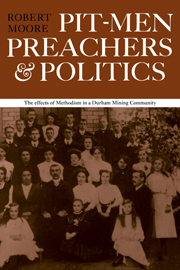Book contents
- Frontmatter
- Contents
- Dedication
- Acknowledgements
- List of abbreviations
- Introduction
- 1 Historical background
- 2 The Deerness Valley
- 3 The social and economic basis of paternalism: the colliery-owners in the Deerness Valley
- 4 Village Methodism – I
- 5 Village Methodism – II: the structure of the Methodist societies in the Deerness Valley
- 6 The respectable Methodists and the old Liberalism
- 7 The radicals and the Labour Movement, 1900–1926
- 8 Methodists in action: three political case studies
- 9 1970 – a postscript
- Conclusions
- Appendix I research strategy and techniques
- Appendix II the Methodist community and objections to Anglican union
- Appendix III the religious statistics
- Appendix IV occupational status, social mobility and the structure of Methodist leadership
- Notes
- Bibliography
- Glossary
- Index
Appendix II - the Methodist community and objections to Anglican union
Published online by Cambridge University Press: 24 November 2009
- Frontmatter
- Contents
- Dedication
- Acknowledgements
- List of abbreviations
- Introduction
- 1 Historical background
- 2 The Deerness Valley
- 3 The social and economic basis of paternalism: the colliery-owners in the Deerness Valley
- 4 Village Methodism – I
- 5 Village Methodism – II: the structure of the Methodist societies in the Deerness Valley
- 6 The respectable Methodists and the old Liberalism
- 7 The radicals and the Labour Movement, 1900–1926
- 8 Methodists in action: three political case studies
- 9 1970 – a postscript
- Conclusions
- Appendix I research strategy and techniques
- Appendix II the Methodist community and objections to Anglican union
- Appendix III the religious statistics
- Appendix IV occupational status, social mobility and the structure of Methodist leadership
- Notes
- Bibliography
- Glossary
- Index
Summary
Towards the end of the research period in the Deerness Valley a short questionaire was conducted among 77 Methodists. The total Methodist membership list was of 130 people in 91 households. Of these people 25 were very well known to me because I had repeatedly visited them and used them as informants on many matters. They had also become my friends. The survey was used to compare the Methodists with whom I was less familiar with the well-known Methodists, in terms of social characteristics and opinions. It is important to note that the 125 Methodists were not unknown to me, but only less well known. A total of 28 were not surveyed because of old age, illness or refusal (12 in all) or because they lived outside the four main villages and could not easily be visited in the two weeks set aside for this phase of the research.
Most of the data collected are not relevant to the present work and will not be discussed. One question, however, elicited answers which seem to confirm the contention that Methodist orientations are highly ethical and communal. The question was ‘Are you for or against union with the Church of England? Why/Why not?’ In answering for or against union respondents gave reasons that can be listed under the following eight headings.
Ethical: Methodists do not drink or gamble, etc., Anglicans do.
Communal: we feel at home in Methodism, we are free and easy, we can talk before the service, etc.
[…]
- Type
- Chapter
- Information
- Pitmen Preachers and Politics , pp. 237 - 239Publisher: Cambridge University PressPrint publication year: 1974



